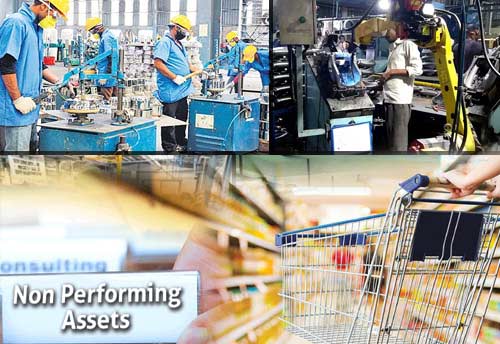Covid stress to build NPAs in MSMEs & Retail sectors
Updated: Dec 28, 2021 10:39:28am

Covid stress to build NPAs in MSMEs & Retail sectors
New Delhi, 28 Dec (KNN) “In the large corporate sector, things have almost stabilized. Fresh NPAs will be few and far between in the coming years. But covid stress has built up in MSME and retail sectors," said Pallav Mohapatra, managing director and CEO, Asset Reconstruction Co. (India) Ltd at the Mint Annual Banking Conclave.
Even as corporate bad loans were brought under control, non-performing assets (NPAs) in small-ticket loans to retail and small businesses are likely to rise in the coming quarters, said experts.
“In the case of retail, repayments are dependent on salaries and during covid and lockdowns there were layoffs, salary cuts and at times people were not paid on time. In the case of MSMEs (micro, small and medium enterprises), their manufacturing activity had stopped and they were not getting workers. If their activity is affected even for 3-4 months, it really impacts cash flows as they do not have other sources to raise money than debt. Banks came out with additional credit lines, and the government with the ECLGS scheme. Despite this, some stress will be seen in MSME and retail," Mohapatra added.
According to R.K. Bansal, managing director and CEO, Edelweiss ARC, the retail and MSME portfolios of banks and non-banking financial companies will witness a rise in stress in the current and following quarters.
“The impact on MSME and retail is too large. For smaller MSMEs and shopkeepers there was no business. Through restructuring and government schemes, we have just deferred the problem. Besides, the new RBI (Reserve Bank of India) guidelines on the classification of NPA, which are now the same for NBFCs and banks, will also be a factor for increase in NPA in retail and MSME," said Bansal.
To be sure, while on the corporate side the NPA levels may have stabilized, the performance of the insolvency and bankruptcy code (IBC), which was brought in to solve the banking industry’s massive bad debt problem, has been called into question due to low levels of recovery on an overall basis.
“IBC, over five years, if you look at the recovery rates, is lower than expectations. This is clearly so because expectations were too high. But I think IBC on paper is a good law. The biggest issue is availability of tribunals, the need for judicial infra to clear case loads quickly and there is a case for more enhanced training. Overall, IBC is a case of good law," said Aniruddha Sen, partner at law firm Trilegal.
Industry experts said given the challenges faced in the IBC process, banks are showing more interest in cleaning up their books through sale to ARCs (asset reconstruction companies) over other routes such as one time settlements (OTS) as reported by mint.
“Seller banks typically have a lot of problems in fixing the sale price, taking the haircut and then worrying about subsequent enquiries, that stops them from taking calls in a situation where a call should have been taken. The ARC sale model is now very mature, standardized. Banks have an auction which is very transparent. Hence, we will see more banks routing through ARC sale, because it looks more clean from their perspective compared to an OTS," said Sanjay Tibrewala, chief executive, Phoenix ARC.
It is obvious that the corporate sector has sufficient reserves to stand back but MSMEs, especially sick units, remain to be suffering.











